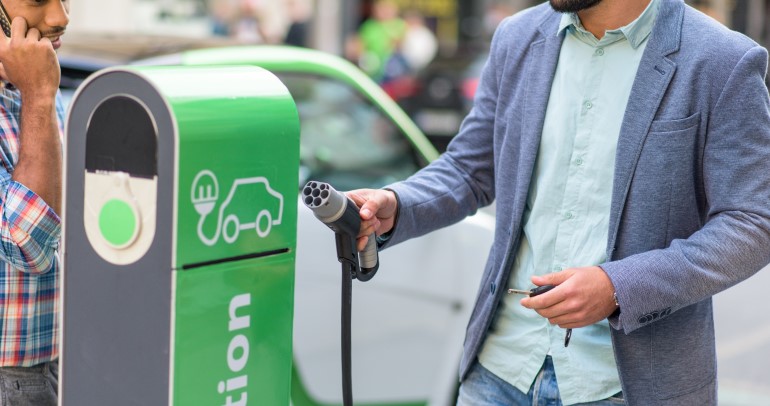
As an avid consumer of automotive-related media, I have a heightened awareness of automotive and mobility messages vying for my attention. Among all of this messaging, it seems like I don’t see very much from the manufacturers, or other stakeholders, around the escalating hot topic of electric vehicles (EVs).
The future of EVs contains a chicken-and-egg question—and not a small one given the size of investment to advance the technology: will a more prevalent charging infrastructure lead to increased EV sales, or will the sales of more electric vehicles force the investment in infrastructure?
In our Escalent Automotive Consumer Pulse Study, an online survey* conducted monthly among approximately 1,000 US adults 18 years of age and older, we asked participants a couple of questions around electric vehicles. First, we probed their “intention to buy an EV” before inquiring about their awareness of EV charging infrastructure or signage. While there are many factors that can influence a purchase decision, we specifically wanted to test our hypothesis that seeing more EV infrastructure and signage would have a positive impact on consumers and increase their confidence to purchase EVs.
The results of our initial research were illuminating. Among those who do recall seeing EV signage and charging stations:
- 47% of participants indicated they would be likely to consider electric vehicles as opposed to 15% who did not notice EV signage or charging stations.
- 50% of participants would likely consider a plug-in hybrid electric vehicle (PHEV) versus 20% who did not see EV signage or charging stations.
- 60% of participants said they would consider a hybrid EV versus 31% who did not notice EV signage or charging stations.
We proved our hypothesis is correct: approximately 30% more participants said they would consider purchasing an EV because they saw charging stations and signage. This demonstrates an important correlation for automakers to consider—providing necessary EV infrastructure and education to consumers translates to increased interest in, and intent to purchase, EVs.
A recent AAA survey revealed that consumers are still generally slow to adopt electric vehicles despite their interest in them, stating: “AAA believes that similar to other emerging technologies, a lack of knowledge and experience may be contributing to the slow adoption of electric vehicles despite Americans’ desire to go green.”
While our high-level research is not definitive, there is an argument to be made that the investment in charging stations and signage in key areas of electric vehicle development will expedite adoption by providing consumers with the knowledge and resources needed to shift to an EV lifestyle.
The development of the EV industry is a key focus of our Automotive & Mobility team at Escalent as we continue to work closely with manufacturers, mobility companies, and other stakeholders of all sizes. Contact me to learn more and stay tuned for more updates as we roll out a new, cutting-edge EV solution later this year.
*Escalent interviewed a national sample of 2,000 consumers aged 18 and up between March and April of 2019. Respondents were recruited from the Dynata and Ipsos panel of US adults and were interviewed online. Quotas were put in place to achieve a sample of age, gender, income, and ethnicity that matches the demographics of the US population. Due to its opt-in nature, this online panel (like most others) does not yield a random probability sample of the target population. As such, it is not possible to compute a margin of error or to statistically quantify the accuracy of projections. Escalent will supply the exact wording of any survey question upon request.








